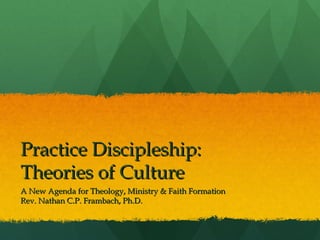
Practicing Discipleship Through Cultural Context
- 1. Practice Discipleship: Theories of Culture A New Agenda for Theology, Ministry & Faith Formation Rev. Nathan C.P. Frambach, Ph.D.
- 2. Three (3) Assertions The Christian gospel and culture(s) cannot be separated We (human beings) live within a pluriverse of cultures Congregations are one of those cultures Workshop goal: cultivate an understanding of culture that will support and serve faithful, truthful, and effective ministry in a missional age
- 3. Three (3) BIG Realities 1. Culture(s) 2. Context 3. Narrative (story) The “cultural turn” from text to context: “Scholars of religion have turned more and more to the interactions and relationships between religion and culture, and to do that requires embedding religion in its contexts.” (Religion and Culture, p. xii) In other words: understanding specific religious beliefs/practices (e.g. Christianity) entails “descending into detail” and engaging specific cultural context
- 4. What is Culture? Here’s a topic: culture. Discuss. The question is: What is culture? Engage. Begin. Discuss. This should be difficult, perhaps even frustrating. Why? Because the “notion” of culture is inherently abstract and nebulous Check out the Websteresque definition, specifically #5
- 5. Culture: Not Generalized Generalized (decontextualized) attempts to understand culture are seldom helpful unless you’re writing a textbook It’s an old analogy, but asking someone to describe their “culture” is like asking a fish to describe water (assuming you can find a talking fish)—it’s hard to see it when you are in it “Culture includes all the things a group does together… Culture is who we are and the world we have created to live in. It is the predictable patterns of who does what and habitual strategies for telling the world about the things held most dear.” (Nancy Ammerman, Studying Congregations, p.15; pp. 78-79)
- 6. Culture: Beyond Dictionary.com To paraphrase anthropologist Clifford Geertz, any road to truly understanding a culture runs through the particular and means “descending into detail” Or, Shrek was right—like ogres and onions, cultures have layers Understanding culture begins with the outer layer— observable behavior, customs, rituals, symbols, language, etc. That’s why we need to shift our attention to particular cultural contexts, specifically, congregations
- 7. What about coNteXt? Here’s another topic: context. Describe your ministry context—the social context of the congregation (e.g., neighborhood, larger community) as well as the congregation itself. Be specific. So how’d that go? Easier than the earlier conversations about “culture”? Probably so—because contexts are more specific. And describing them is more like telling a story.
- 8. Congregation as context “Each congregation sees it self as a community of God, dedicated to sacred things. Yet congregations are also social institutions…they are places where people interact, working with one another and serving constituents…the congregation is analyzed as a unit, and as a unit interacting with other units in society: people, organizations, and cultures…Even as it is dedicated to God, your congregation is a human institution located in history (the date of its founding to the present), in a specific place in geography (your community), and in the lives of its members (the network “maps” of their lives).” Eiesland & Warner, Studying Congregations, pp. 40—43)
- 9. Descend Into Detail A deliberate, specific focus on context means at least two (2) things for leadership in ministry: 1. Moving beyond a “theology as projectile” view of congregational context and unearthing the theology that is embedded there 2. In order to do this we need to learn how to carefully attend to the context without rushing to impose a “theology” on it This demands some tools from the social sciences (e.g., ethnography, interviews, congregational timeline)—a new skill-set for many of us, but skills that can be learned
- 10. Ethnography, for example It’s beyond the scope of this workshop to get into these various approaches Studying Congregations is an excellent resource (particularly chapter 7) Ethnography is a focused, disciplined attentiveness to a particular context with the goal of understanding it better It is a kind of holy listening that pays close attention to narrative and stories
- 11. Narrative & Storied Living One more topic for discussion: story Tell your congregation’s story Or tell a story about the congregation where you serve Or tell a story about a significant ministry experience connected to the congregation where you serve The point is to help us conclude with a focus on practices that empower faithful, truthful, and effective ministry
- 12. Three (3) Practices of Story We want to conclude by proposing some practices of story that can help us unearth signs of God’s presence and activity in specific, cultural, congregational contexts 1. Dwelling in God’s Story 2. The practice of “story hearing”—listening, listening, listening 3. Story-telling and telling the Story One way to understand culture is to understand a cultural context, and one effective approach to understanding a cultural context is a focus on narrative—which begins with the mutual relationship between hearing story and telling story.